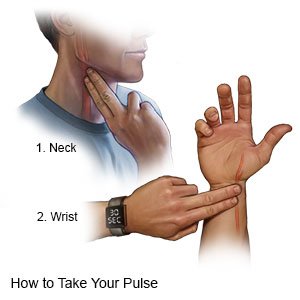How to Take A Pulse
Medically reviewed by Drugs.com. Last updated on Apr 6, 2025.
What is a pulse?
Your pulse is your heartbeat. The range for an adult pulse is 60 to 100 beats a minute. The 2 most common areas to feel your pulse are your wrist and neck. You may need to check and record your pulse rate because of an illness or certain medicines.
How do I check the pulse on my wrist?
- Place your index and middle fingers on the inside of your wrist, below your thumb.
- Use a watch with a second hand and count your pulse for 60 seconds.
- Write down your pulse rate, the date, time, and which side was used to take the pulse. Also write down anything you notice about your pulse, such as that it is weak, strong, or missing beats.
How do I check the pulse on my neck?
- Place your index and middle fingers on one side of your neck, just under your jaw, where your neck and jaw meet.
- Use a watch with a second hand and count your pulse for 60 seconds.
- Write down your pulse rate, the date, time, and which side was used to take the pulse. Also write down anything you notice about your pulse, such as that it is weak, strong, or missing beats.
-

What else do I need to know?
Your healthcare provider will tell you how often to check your pulse. You may need to check your pulse regularly, such as before and after you take medicine. Your healthcare provider will tell you when to contact him if it is out of your usual range. Keep a record of your pulse rate and take it with you to your follow-up visits.
When should I contact my healthcare provider?
- Your pulse rate is higher or lower than the range your healthcare provider gave you.
- You have questions or concerns about your condition or care.
When should I seek immediate care or call 911?
- You feel dizzy or lightheaded.
- You feel like you are going to faint.
Care Agreement
You have the right to help plan your care. Learn about your health condition and how it may be treated. Discuss treatment options with your healthcare providers to decide what care you want to receive. You always have the right to refuse treatment. The above information is an educational aid only. It is not intended as medical advice for individual conditions or treatments. Talk to your doctor, nurse or pharmacist before following any medical regimen to see if it is safe and effective for you.© Copyright Merative 2025 Information is for End User's use only and may not be sold, redistributed or otherwise used for commercial purposes.
Further information
Always consult your healthcare provider to ensure the information displayed on this page applies to your personal circumstances.
